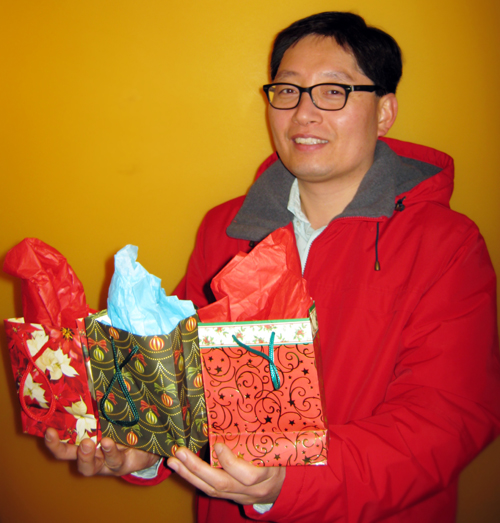
Oops, you did it again. You bought a few things you didn’t really need at that blowout sale and spent more than you’d planned. No big deal, but for many people shopping beyond their means is a habit that turns into a chronic problem – one that may leave them unable to pay their rent, utility bills or worse.
Holidays should be a happy time, but the seasonal music, shiny new products and discount offers can be especially tempting to some compulsive buyers. The thrill of the purchase can lead them to go over their budget and suffer emotionally as well as financially. For others, an irresistible unconscious urge drives them towards the stores’ twinkling lights and check-out counters where they feel uplifted until the shopping spree is over.
Trained in consumer psychology and social cognition, marketing and consumer studies professor Sunghwan Yi has expanded his research interests in gambling and substance abuse into excessive buying behaviour. He has been investigating the characteristics and motivations of excessive buyers for the past four years. His most recent studies suggest that there are different types of compulsive buyers and not all experience low self-esteem, anxiety and depressive symptoms as precursors to buying lapses.
“Research work in this area has often lumped excessive buyers together into one homogeneous group who buy in excess to escape negative feelings about themselves,” says Yi. “However, I have always suspected that some excessive shoppers buy to alleviate boredom or to seek excitement, which positively reinforces the shopping urge. So a colleague and I decided to conduct a survey study and find out from a group of excessive buyers how they usually feel before splurging.”
Yi’s new study invited shoppers to report their buying habits and 813 respondents aged 20 and older met the eligibility criteria: they had to recall experiencing two or more buying lapses in a four week period. In other words, within that time frame, they remembered having spent $50 or more shopping without considering or in spite of the consequences at least twice. About 58 per cent of the respondents exceeded the diagnostic cut-off for compulsive spending.
Yi’s inventory of buying lapses was adapted from methods used in gambling and alcohol addiction-related research. He used latent profile analysis to classify the study participants into three distinct subtypes: escape seekers, excitement seekers and “low affect management buyers,” a cluster whose frequency of intense negative feelings, intense boredom and intense positive feelings was lower than the other two subtypes combined.
“Escape seekers – the type with the most severe compulsive buying habit – tend to buy when they are in a negative frame of mind. They frequently suffer from feelings like anxiety and a deep-seated sense of shame. It is almost impossible for them to meet their own unreasonably high expectations and so they continuously feel bad about themselves and take even mild criticism hard. Focusing on the immediate task of shopping serves to distract them from their negative mood and they temporarily experience relief from their chronic emotional undercurrent of inferiority.
“Excitement seekers, on the other hand, tend to buy to reduce boredom in their daily life. They turn to shopping as something fun to do when they lack stimulation: a sensory-rich shopping environment is their antidote of choice. Also, they are more materialistic than their escape-seeking counterparts and more competitive spirited. Excitement seekers aim to ‘keep up with the Joneses,’ so they tend to be more gullible to sales pitches for products that promise improved quality of life or status.
“The third cluster of buyers extracted from our analysis showed substantially less compulsive consumption than the other two subtypes overall. I call them ‘low affect management’ buyers because they are not shopping out of a need to regulate their emotions. This cluster of shoppers comprises people who are not particularly unhappy or bored, but seem to shop on a whim. Their impulse to shop is commonly triggered by external cues such as a ‘big sale’ sign or an in-store promotion.”
Although this third subtype’s shopping habit does not qualify as pathological compulsive buying now, Yi cautioned, they demonstrate a tendency that can lead to problems in the future.
Yi says there are important implications concerning treatment strategies for compulsive shoppers.
“Each group can benefit from different advice,” he says. “For example, while escape seekers would do well to receive counselling to help them overcome their chronic feelings of self-doubt, excitement seekers should be encouraged to reduce boredom by developing new hobbies and engaging in a variety of healthy, low-budget activities such as cooking and hiking.”
Yi says browsing the Web leads all kinds of people into temptation to shop. To beat the trend towards online shopping, he says excessive buyers need to be extra careful and mindful of their mood.
These tips may help shoppers avoid overspending:
- When you feel the desire to go shopping, ask yourself, “What am I feeling right now?”
- Ask yourself, “Do I really need this?” Maybe you could borrow that book from the library instead.
- Put a list of other interesting or fun things to do on the fridge where you will see it every day. Whenever you feel the urge to shop, do one of those activities instead.
- Avoid online shopping whenever possible. It’s all too easy to buy things you don’t need when there’s an offer of free shipping and handling with a minimum purchase.
- If you do shop online, don’t allow auto-fill to remember your credit card number. The hassle of typing it in every time might make you think twice.
- Use cash. Previous research shows that using debit and credit cards numbs the pain of parting with your hard-earned money.
Finally, breaking bad habits requires developing new routines, says Yi. Building emotional links with something healthy and easy on the bank account could be the best gift of all any time of the year.